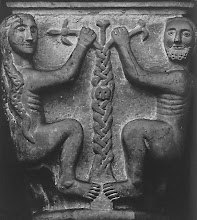p. 27, “Clearances,” Seamus Heaney
When all the others were away at Mass
I was all hers as we peeled potatoes.
They broke the silence, let fall one by one
Like solder weeping off the soldering iron:
Cold comforts set between us, things to share
Gleaming in a bucket of clean water.
And again let fall. Little pleasant splashes
From each other’s work would bring us to our senses.
So while the parish priest at her bedside
Went hammer and tongs at the prayers for the dying
And some were responding and some crying
I remembered her head bent towards my head,
Her breath in mine, our fluent dipping knives—
Never closer the whole rest of our lives.
Again, I love that subtle rhyme—almost every line rhymes with the one after. But the rhyme is very quiet, very slight, and never satisfyingly complete (“at Mass” with “potatoes,” “by one” with “iron,” “to share” with “water,” “at her bedside” with “towards my head.”) Rhyme often functions to give a musicality to the lines. But I think in this poem that partial rhyme also carries some of the feeling of the poem, how this mother and son come close but never quite chime together, or like the last line says: “Never closer in all our lives.” For the boy, that time peeling potatoes on Sundays was a time approaching rhyme, approaching closeness, approaching music—not quite there, but close—the closest they got and the dearest thing to be remembered now. And I like the insight: that what connects us with our loved ones are these quiet, unspectacular times working together. That those matter more than dramatic carryings-on and fine phrases. "Would that there were more of them and that death did not end them," I think this poem says.
skip to main |
skip to sidebar


All text (excluding quoted poems and comments) within Matter | Pattern by Emma J is licensed under a Creative Commons Attribution-Noncommercial-Share Alike 3.0 United States License.
living with poetry
"Let our words be as necessary and useful as once were words of magic.
This is an unachievable ideal."
Anna Swir (1909 - 1984)
This is an unachievable ideal."
Anna Swir (1909 - 1984)
. . . . and elsewhere
Matter | Pattern

matter [ME matere, fr. OF matere, matiere, fr. L materia] tree trunk (<"matrix," the tree's source of growth) matter, subject, physical substance, wood for building, fr. mater mother
mother Based ultimately on the baby-talk form ma- 2 [Indo-European ma - 1 <"good" with derivatives meaning "occurring at a good moment, timely, seasonable, early, ripe" ; ma- 2 <"breast" an imitative root derived from the child's cry for the breast, a linguistic near-universal found in many of the world's languages; ma- 3 <"damp ") [ME moder, fr. OE modor, akin to OHG muoter, ON mothir, L mater (maternal, maternity, matriculate, matrix, matron), Gk meter (metro-, metropolis [<"mother city]; Demeter [< "god-mother"], Skt matr]
meter [ME meter, metre, fr. OE & MF, fr. L metrum, fr. Gk metron (<"measure" ) fr. IE root me-] meter, metrical, diameter, geometry, metronome. Suffixed forms mens, men-ot (<"moon, month") an ancient and universal unit of time measured by the moon (menarche, meniscus, menopause, menses, menstrual, bimester, semester, trimester).
poetry [fr. ME poet, poete fr. OF poete, fr. L poeta, fr. Gk poietes, poetes <"maker, composer, poet, fr. poien to make, do , create, compose"] akin to Skt cinoti <"he gathers, heaps up, piles in order," OSlav ciniti <"to arrange, to pile up"
padre from papa, a child's word for "father," a linguistic near-universal found in many languages. [IE root pa- <"to protect, feed" (fodder, forage, pabulum, food, foster, pasture, repast, pastor <"shepherd, protector") (ME fader, fr. OE faeder; akin to OHG fater, ON fathir, Goth fadar, L pater, Jupiter [<"god-father"], patrare [<"to bring about"]; Gk pater, Skt pitr) patrician, patrimony, patron, pater, paternal
pattern [ME patron, fr. MF, fr. L patronus (<"master, pattern") fr. L defender, protector, advocate, fr. patr-, pater (<"father") a fully realized form, original, or model accepted or proposed for imitation, archetype, exemplar.
mother Based ultimately on the baby-talk form ma- 2 [Indo-European ma - 1 <"good" with derivatives meaning "occurring at a good moment, timely, seasonable, early, ripe" ; ma- 2 <"breast" an imitative root derived from the child's cry for the breast, a linguistic near-universal found in many of the world's languages; ma- 3 <"damp ") [ME moder, fr. OE modor, akin to OHG muoter, ON mothir, L mater (maternal, maternity, matriculate, matrix, matron), Gk meter (metro-, metropolis [<"mother city]; Demeter [< "god-mother"], Skt matr]
meter [ME meter, metre, fr. OE & MF, fr. L metrum, fr. Gk metron (<"measure" ) fr. IE root me-] meter, metrical, diameter, geometry, metronome. Suffixed forms mens, men-ot (<"moon, month") an ancient and universal unit of time measured by the moon (menarche, meniscus, menopause, menses, menstrual, bimester, semester, trimester).
poetry [fr. ME poet, poete fr. OF poete, fr. L poeta, fr. Gk poietes, poetes <"maker, composer, poet, fr. poien to make, do , create, compose"] akin to Skt cinoti <"he gathers, heaps up, piles in order," OSlav ciniti <"to arrange, to pile up"
padre from papa, a child's word for "father," a linguistic near-universal found in many languages. [IE root pa- <"to protect, feed" (fodder, forage, pabulum, food, foster, pasture, repast, pastor <"shepherd, protector") (ME fader, fr. OE faeder; akin to OHG fater, ON fathir, Goth fadar, L pater, Jupiter [<"god-father"], patrare [<"to bring about"]; Gk pater, Skt pitr) patrician, patrimony, patron, pater, paternal
pattern [ME patron, fr. MF, fr. L patronus (<"master, pattern") fr. L defender, protector, advocate, fr. patr-, pater (<"father") a fully realized form, original, or model accepted or proposed for imitation, archetype, exemplar.
Blog Archive
-
▼
2007
(31)
-
▼
November
(25)
- “Winter Verse for His Sister,” by William Meredith
- from "Three Poems for a Twenty-Fifth Anniversary,"...
- “Sent to Her Elder Daughter from the Capital,” by ...
- “September, the First Day of School, #1,” by Howar...
- “For a Five-Year-Old,” by Fleur Adcock
- “Night Terrors,” by Alan Shapiro
- “Instinct,” by C.K. Williams
- "To my Daughter" by Stephen Spender
- "A Cradle Song" by W.B. Yeats
- "The Tempest - to my daughter Miranda" by Stephen ...
- "Morning Song" by Sylvia Plath
- "Five a.m., the Ninth Month" by Jacqueline Osherow
- "After Midnight, the Fifth Month" by Jacqueline Os...
- "Infertility" by Edward Hirsch
- "My Husband before Leaving" translated by J. Mouss...
- "Lesson" by Forrest Hamer
- "Letter of Recommendation" by Yehuda Amichai
- "Those Winter Sundays" by Robert Hayden
- "I Ask my Mother to Sing" by Li-Young Lee
- "Clearances" by Seamus Heaney
- "Portrait of my Mother on Her Wedding Day" by Celi...
- "The Journey," by David Ignatow
- "Nikki-Rosa," by Nikki Giovanni
- A Poem a Day for 30 Days: #1“There Was a Child Wen...
- Where I'm Coming From: Biases and Blindspots
-
▼
November
(25)
I am

All text (excluding quoted poems and comments) within Matter | Pattern by Emma J is licensed under a Creative Commons Attribution-Noncommercial-Share Alike 3.0 United States License.

